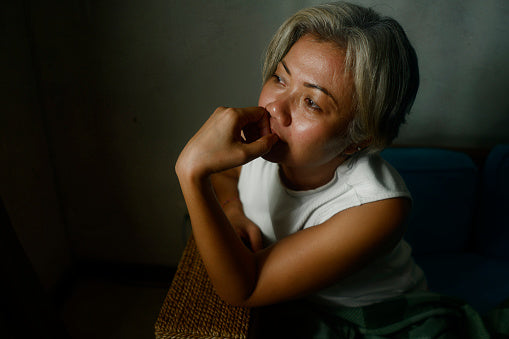Hypoactive Sexual Desire Disorder (HSDD)

Sometimes you want sex, sometimes you don’t. That’s normal. Every woman has her own level of what is considered “normal” based on their own experiences and biological drive. But when a woman has a low libido or low sexual desire and is bothered by this lack of interest in sex, she may have a condition called hypoactive sexual desire disorder (HSDD).
HSDD is defined as the absence of sexual fantasies and thoughts, and/or desire for or receptivity to, sexual activity that causes the personal distress or difficulties in her relationship. This distress is an important component. After all, some women with what is considered a low libido may not have any distress or problems with a partner as a result.
While prevalence rates vary, The Society for Women’s Health Research estimates that about one in ten women have HSDD, making it one of the most common female sexual difficulties.
What causes HSDD?
There are many potential causes, both physical and psychological.
- There are a number of physical conditions associated with HSDD, including breast cancer, diabetes, depression, urinary incontinence, thyroid problems, and multiple sclerosis, among others.
- An imbalance of neurotransmitters (chemicals) in the brain may be the cause, as the chemicals that can cause (or inhibit) sexual desire and excitement may be out of balance.
- Diminished libido may be a side effect of certain medications, including medications used to treat depression, anxiety and high blood pressure, as well as some medications to treat pain.
- Relationship issues may play a role for some women. If there is conflict or a lack of trust in a relationship, women may lose interest in sex with that partner as a result. (Although it should be noted that a woman may experience HSDD and not be in a relationship).
- Some psychological conditions may be associated with the development of HSDD, including depression, anxiety and low self-esteem.
Can HSDD be treated?
HSDD is treatable and can be manageable, so the first step if you are concerned about a lack of interest in sex is to talk to a healthcare provider to see what options are available. The provider may ask a series of questions called the Decreased Sexual Desire Screener (DSDS) to help diagnose HSDD. The first four questions are:
- In the past, was your level of sexual desire/interest good and satisfying to you?
- Has there been a decrease in your level of sexual desire/interest?
- Are you bothered by your decreased level of sexual desire/interest?
- Would you like your level of sexual desire/interest to increase?
If a woman answers ‘no’ to any of these questions, she likely will not be diagnosed with HSDD. If she answers ‘yes’ to these, she will also be asked about other factors that may be contributing to her low desire, including physical and mental health conditions, recent childbirth, her relationship with her partner, her level of stress and fatigue, and other issues.
Treatment may include sex therapy or counseling, alone or with a woman’s partner, to address any mental health or relationship issues that may be present. Medications may be evaluated as contributing factors, and underlying medical conditions may be addressed.
For women who have not yet gone through menopause, there is a single FDA-approved treatment for HSDD called flibanserin. This drug works on neurotransmitters, or chemicals, in the brain that are related to sexual excitement. When these chemicals in the brain are out of balance, the result can be a diminished level of sexual interest and desire. Flibansarin, taken as a once-daily pill helps to keep these chemicals in balance.
We do our best at Vespertine to curate products and resources to help our clients improve their sexual wellness and conditions. A few books we have may offer advice to those facing complications like HSDD:
Come As You Are by Emily Nagoski
“Emily Nagoski has written one of the most important books about sex any woman (or anybody else) could ever pick up, full of insights that are both fascinating and deeply useful. Synthesizing new research and theory about sexuality with old-school sex-positive information of the sort you didn’t learn in sex ed (unless, perhaps, you are a Unitarian, or Scandinavian, or lucky enough to be in Dr. Nagoski’s class), I guarantee Come As You Are will open minds and change lives.”
— Carol Queen, Ph.D., Founding director, Center for Sex & Culture
Healing Painful Sex, by Deborah Coady, MD and Nancy Fish, MSW, MPH.
"With an optimistic, holistic, and mindful approach to healing, Coady and Fish provide empathy, support, and most important, a thorough education about the possible causes, approaches, and treatment options."
- Talli Y. Rosenbaum, MSc, PT, AASECT, Associate Editor, Journal of Sexual Medicine
"Aphrodisiac is the book that I've always wanted! It encompasses a truly holistic understanding of sexuality that includes our relationship with the natural world and its healing, life-enhancing, Eros-encouraging plants. Just reading the recipes alone is a huge turn-on! Let Kimberly be your brilliant, wise, and empowering guide to the luscious world of wondrous plants (along with rituals, meditations, and more) that have the power to enhance our erotic connections with ourselves, with others, and with nature."
- Sheri Winston, wholistic sexuality teacher, author of the award-winning Women's Anatomy of Arousal and Succulent SexCraft, founder of the Intimate Arts Center
This article on comprehensive sex education has been reposted from ASHA's website ashasexualhealth.org




Leave a comment